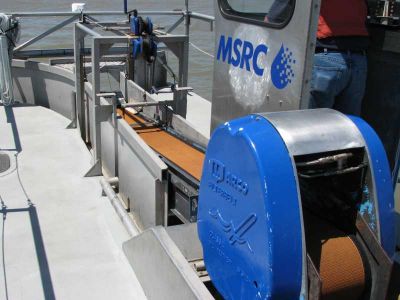MARAD to Trial Autonomous Spill-Response Vessel
Boston-based Sea Machines Robotics has entered into a cooperative agreement with the U.S. Maritime Administration (MARAD) to demonstrate the ability of autonomous technology in increasing the safety, response time and productivity of marine oil spill response operations.
Sea Machines will install its SM300 autonomous-command system aboard a Marine Spill Response Corp. (MSRC)-owned MARCO skimming vessel and will train MSRC personnel to operate the system. Then, on August 21, Sea Machines and MSRC will execute simulated oil spill recovery exercises in the harbor of Portland, Maine, before an audience of government, naval, international, environmental and industry partners.
 The response skimming vessel is manufactured by Kvichak Marine Industries, of Seattle, and is equipped with a MARCO filter belt skimmer to recover oil from the surface of the water. This vessel typically operates in coastal or near-shore areas. Once installed, the SM300 will give the MSRC vessel the following new capabilities:
The response skimming vessel is manufactured by Kvichak Marine Industries, of Seattle, and is equipped with a MARCO filter belt skimmer to recover oil from the surface of the water. This vessel typically operates in coastal or near-shore areas. Once installed, the SM300 will give the MSRC vessel the following new capabilities:
• Remote autonomous control from an onshore location or secondary vessel,
• ENC-based mission planning,
• Autonomous waypoint tracking,
• Autonomous grid line tracking,
• Collaborative autonomy for multi-vessel operations,
• Wireless remote payload control to deploy onboard boom and other response equipment, and
• Obstacle detection and collision avoidance.
Sea Machines enables minimally manned and unmanned autonomous operations. Such configurations allow operators to respond to spill events 24/7 depending on recovery conditions, even when crews are unavailable or restricted. These configurations also reduce or eliminate exposure of crew members to toxic fumes and other safety hazards.
“Autonomous technology has the power to not only help prevent vessel accidents that can lead to spills, but can also facilitate better preparedness; aid in safer, efficient, and effective clean-up,” said CEO Michael G. Johnson, Sea Machines.
“Our number one priority is the safety of our personnel at MSRC,” said John Swift, vice president, MSRC. “The ability to use autonomous technology – allowing response operations to continue in an environment where their safety may be at risk – furthers our mission of response preparedness.”

that matters most
Get the latest maritime news delivered to your inbox daily.
Sea Machines’ SM Series of products can be installed aboard existing or newbuild commercial vessels.
Sea Machines is also a leading developer of advanced perception and navigation assistance technology for a range of vessel types, including container ships. The company is currently testing its perception and situational awareness technology aboard one of A.P. Moller-Maersk’s newbuild ice-class container ships.
